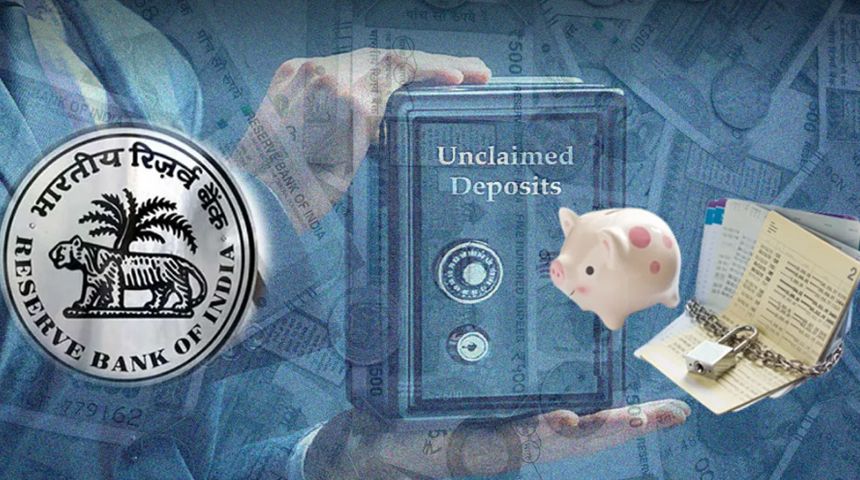Reserve Bank of India (RBI) governor Shaktikanta Das on Thursday launched UDGAM, an unclaimed deposits – gateway to access information, a centralised web portal, which would make it easier for people to search for their unclaimed deposits across multiple banks in one place. A public interest litigation (PIL) pending before the Supreme Court filed by Sucheta Dalal, managing editor of Moneylife and founder-trustee of Moneylife Foundation, also seeks to make public on a centralised platform details of unclaimed money of investors and depositors taken by various regulators and which remains inaccessible to rightful legal heirs.
The launch of the web portal will aid users in identifying their unclaimed deposits and accounts and enable them to either claim the deposit amount or make their deposit accounts operative at their respective banks, RBI says.
To begin with, bank customers could access the details of their unclaimed deposits regarding seven banks presently available on the portal.
The search facility for remaining banks on the portal will be made available in a phased manner by 15 October 2023.
Reserve Bank Information Technology Pvt Ltd (ReBIT), Indian Financial Technology & Allied Services (IFTAS), and participating banks have collaborated on developing the portal.
In April, RBI governor Das announced the development of a common web portal to search for unclaimed deposits. At present, the depositors or beneficiaries of unclaimed bank deposits of 10 years or more have to go through the websites of multiple banks to locate such deposits.
According to the Union government, the total unclaimed deposits transferred to RBI by the public sector banks (PSBs) as of February 2023 was Rs35,012 crore.
RBI says UDGAM has been launched amid a rising amount of unclaimed deposits in banks, and it has been undertaking public awareness campaigns from time to time to sensitise the public on this matter.
Further, through these initiatives, the RBI has been encouraging people to identify and approach their respective banks for claiming unclaimed deposits.
The deposits remaining unclaimed for 10 years in a bank are transferred to the depositor education and awareness (DEA) fund maintained by RBI. Depositors’ protection being an overarching objective, RBI says it has been taking various measures to ensure that newer deposits do not turn unclaimed and existing unclaimed deposits are returned to the rightful owners or beneficiaries after following due procedure.
On the second aspect, RBI says banks display the list of unclaimed deposits on their website. “To improve and widen the access of depositors or beneficiaries to such data, RBI has decided to develop a web portal to enable search across multiple banks for possible unclaimed deposits based on user inputs. The search results will be enhanced by the use of certain artificial intelligence (AI) tools.”
Sucheta Dalal, managing editor of Moneylife and founder-trustee of Moneylife Foundation, had filed a public interest litigation (PIL) in the Supreme Court on making public on a centralised platform details of unclaimed money of investors and depositors taken by various regulators and which remains inaccessible to rightful legal heirs.
In response to the petition, the RBI submitted that, during FY21-22, the depositors’ DEAF refunded Rs505.51 crore of 187,975 claimants. According to RBI, settling disputed claims by banks may involve adjudication of facts and appreciation of evidence which are normally subject matters of the court and could lead to avoidable litigation involving the banks, which is not in the interest of the banks and their depositors.
The plea, taken up by senior counsel Prashant Bhushan, is about making public on centralised platform details of unclaimed money of investors and depositors taken by various regulators and remains inaccessible to rightful legal heirs.
In her plea, Ms Dalal contended that unclaimed funds of the public get transferred to government-owned funds like the Depositor’s Education and Awareness Fund (DEAF), Investor’s Education and Protection Fund (IEPF) and Senior Citizen’s Welfare Fund (SCWF) on the ground that the legal heirs or nominees did not claim them, should be made available to the legal heirs or nominees by providing information of holders of inoperative or dormant accounts on a centralised online database.
The petition urges developing a centralised online database under the control of RBI that will provide information about the deceased account holder, including such details as the name, address and last date of transaction by the deceased account holder. Further, it should be mandatory for banks to inform RBI about the inoperative or dormant bank accounts, and this exercise should be repeated after an interval of nine to 12 months.
In response to the petition, RBI submitted that, during FY21-22, the depositors’ education and awareness fund (DEAF) refunded Rs505.51 crore of 187,975 claimants. According to RBI, settling disputed claims by banks may involve adjudication of facts and appreciation of evidence which are normally subject matters of the court and could lead to avoidable litigation involving the banks, which is not in the interest of the banks and their depositors.
Keeping in view the imperative need to avoid inconvenience and undue hardship to the common person, RBI says it had advised banks to decide the threshold, based on their respective risk management systems, up to which they may settle claims in respect of the deceased depositors (in case of accounts without the survivor or nominee clause) based on a letter of indemnity.
IEPF, which holds monies from the unclaimed dividend account that remains unpaid or unclaimed for seven years, offers a search facility on its website, operated under MCA-21. Further, IEPF has relaxed certain requirements, including advanced receipt, succession certificate or probate of a will (relaxed for a claim of Rs5 lakh for physical and demat shares). It also allowed self-attestation by the claimant instead of notarised documents while relaxing the requirement of affidavits and surety.
As of 31 January 2023, IEPF processed 74,396 claims and transferred dividends worth Rs35.18 crore to claimants. It also transferred 2.29mn (million) shares to the claimants.


